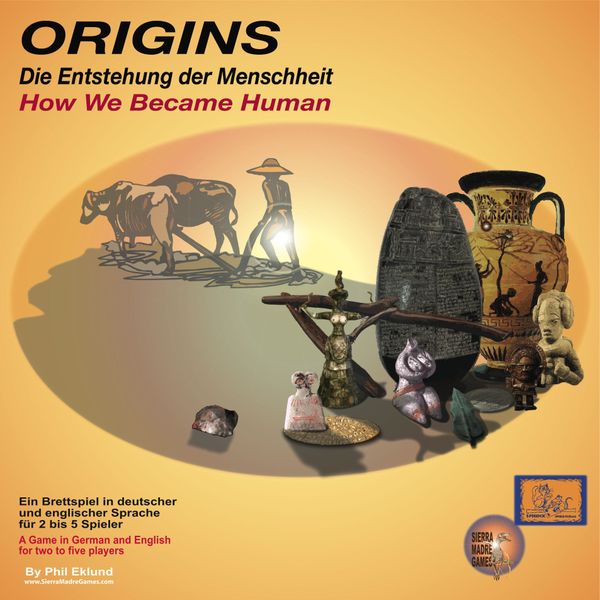Origins: How We Became Human is a board game designed by Phil Eklund and published by Sierra Madre Games in in 2007. The game focuses on the evolution of human civilization, starting from the prehistoric era.
Game Components of Origins: How We Became Human
Game board depicting various regions of the worldPlayer tokens and cubes representing different human subspecies (e.g., Hobbits, Neanderthals, Cro-Magnon)Cards for brain development, energy sources, metallurgy, and other technological advancementsElders and population tracksResource tokensClimate change and disaster diceDomestication and acculturation mechanics components
How To Setup Origins: How We Became Human
Setting up the game involves placing the game board, distributing player tokens and cubes according to their starting locations, and shuffling the card decks. Each player selects a human subspecies to represent, such as the Hobbits starting in Indonesia or the Neanderthals in Spain. The initial setup can take around 20 minutes.
Gameplay Mechanics and Game Objective
Evolution and Brain Development: Players open up areas of their brain to gain new abilities and skills.Era Progression: The game transitions through different eras, each focusing on different challenges and technological advancements (e.g., metallurgy, energy sources, immunity to diseases).Resource Management: Players manage resources, build cities, domesticate crops and animals, and acquire wise elders.Interplayer Interaction: Players can imitate rivals’ advancements, trade, or attack each other.Climate Change and Disasters: Players must adapt to climate changes and other disasters that can significantly impact their progress.Acculturation and Domestication: Mechanics that allow players to influence other players’ cultures and resources.Objective: The ultimate goal is to evolve and develop your human subspecies to the point of becoming a civilized society, scoring victory points by achieving technological, cultural, and territorial milestones.
Player Experience
Playing **Origins: How We Became Human** is a deeply engaging and strategic experience. Players must balance the need to evolve their species’ cognitive abilities with the necessity to adapt to environmental challenges and interact with other players. The game fosters a sense of historical progression, as players start from primitive conditions and evolve into complex civilizations. The game can be quite lengthy, taking around 6½ hours to complete.
Pros
Historical and Scientific Depth: The game is rich in historical and scientific themes, providing a unique educational experience.Complex Strategy: Offers deep strategic gameplay with multiple paths to victory.Interplayer Dynamics: Encourages interaction and competition between players.Beautiful Components: The game board and components are praised for their aesthetic and functional design.
Cons
Lengthy Gameplay: The game can be very long, which may deter some players.Complex Rules: The initial rules can be cumbersome, and some mechanics (like acculturation) may need adjustments for a smoother experience.Climate Change and Disasters: Random events can significantly hinder progress, leading to frustration.Setup Time: The setup process is quite lengthy.
Personal Thoughts on Origins: How We Became Human
**Origins: How We Became Human** is ideal for players who enjoy complex, strategic games with deep thematic integration. It is particularly suited for those interested in history, anthropology, and the evolution of human societies. However, due to its complexity and length, it may not be the best fit for casual gamers or those looking for a quick game session. With the right group and the application of optional rules to smooth out some of the rough edges, this game can provide a highly rewarding and immersive experience.
We are supported by our audience. When you purchase through links on our site, we may earn an affiliate commission, at no extra cost for you. Learn more.

